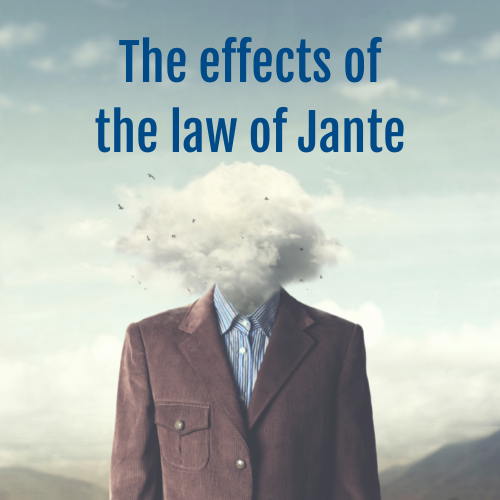
What is the law of Jante?
Don’t think you are better than anybody else! That is how the law of Jante could be simplified, and this sentiment has in large colored the social culture and norm in the Scandinavian countries, and I as a Swede grow up with this as a leading star, even if it was unspoken.
Today I will take a closer look at the law of Jante, its background, and how it has affected Swedish society and manifest itself in many of the typical Swedish behavior I talked about in my last episode. The actual law of Jante was first published in the novel by the Norwegian Danish author Aksel Sandemose. The name of the novel is “A Fugitive Crosses His Tracks”, en flykting korsar sitt spår, and was published in 1933 in the novel a young man returns to his home, a small village called Jante, and this little village was ruled by the law of Jante,
The 10 laws of Jante
There are actually 10 laws of Jante
- First, one is don’t think that you are special.
- Number two is don’t think that you are of the same standing as us.
- Number three, don’t think that you are smarter than us.
- Number four, don’t fancy yourself as being better than us.
- Number five, don’t think that, you know, more than us.
- Number six don’t think that you are more important than us.
- Number seven. Don’t think that you are good at anything.
- Number eight, don’t laugh at us.
- Number nine. Don’t think that anybody cares about you.
- And number 10, don’t think that you can teach us anything.
These 10 laws are usually summed up in one sentence. You’re not to think that you’re anyone special or think that you are better than us. And if you go against this law, you are looked upon with suspicion and hostility. And the purpose of the law is to preserve social stability.
This is of course, as I said, unwritten law and more of social conduct, but it is deeply rooted in Swedish society. And this is why equality is such an important part of Sweden. It’s more about not making others feel worse than it is not promoting yourself.
How this affects us Swedes
The younger generation doesn’t suffer from the law of Jante, the same way as when I grew up. I was born in the late fifties and grew up in a society where the law of Jante was very much observed.
So it’s very hard as a Swede to promote yourself or say that you are good at something, but it can also be very liberating. You don’t have the pressure of being on top and succeed all the time. You can be very happy as being average. You don’t stand out and you don’t have the pressure of always succeeding.
So how was it to come to the USA as a Sweden? Well, the US is very much the opposite of the law of Jante. It is good to elevate yourself, it’s very competitive. And when I first moved here, I looked at the Americans as they were bragging and they were very self-absorbed
Today I have adjusted quite a bit and I can see the benefits of promoting yourself, but it has taken me a really long time. I am still very much a product of the law of Jante, and I have a really hard time saying that I am good at anything, even when I know that to be the truth. Today I know that I have qualities that are really good, but you will rarely hear me say that out loud.
It was very hard for me to start a YouTube channel, sitting in front of the camera and talking to you really is something I must force myself to do still, and the same with now creating a podcast, because who am I to think that anybody would be interested in listening to what I have to say, what do I have to offer to anybody else?
This is real. When you are the product of the law of Jante, and at my age, you really have to fight against the feelings of guilt and that you are bragging if you ever say that you are good at something. I know a lot about Sweden, which is the topic of this podcast, and it’s still hard for me to say it. So the next time you meet a Swede, and you think that they are quiet and standing back a bit and don’t take part or try to position themselves in a favorable way, remember that they are a product of the law of Jante. And even though we would like to succeed in life, it is really hard to promote ourselves

But there are positive sides as well
But there are advantages to this mindset as well. For one thing, it makes life less stressful when it comes to career and success. You don’t fall into the chasing success trap which is more common over here.
And a fact is that since 2013 all five Scandinavian countries, Iceland, Norway, Sweden, Finland, and Denmark have been within the top 10 countries in the world on the World Happiness Report, which I have a link to in the show notes on my website aswedishfika.com
The report says whether we look at the state of democracy and political rights, lack of corruption, trust between citizens, felt safety, social cohesion, gender equality, equal distribution of incomes, Human Development Index, or many other global comparisons, one tends to find the Nordic countries in the global top spots.
Nowhere in this report do they make a connection with the law of Jante but non of the points they talk about surprised me at all. We have a tendency to look out for the best of the many before the individual advantages. We also have high trust in our political system and feel that we are heard and represented in a way that I don’t meet among voters in the US. The trust between citizens is high in Sweden, and it feels very safe. I will talk more about many of these topics in upcoming episodes and do a more personal reflection and comparison between Sweden and the US for example when it comes to our political systems, equal distribution of income, or rather why Swedes don’t mind paying such high taxes, and gender equality.

On a more personal level
But on a more personal level, I must say that I feel more pressure to succeed in anything I try to do over here than I ever did in Sweden. One example is my YouTube channel, where I after two years haven’t reached the threshold for getting monetized, and people don’t understand why I keep on doing it. It is really hard to explain that for me the success I feel is not measured in the number of subscribers or if I will make money from the channel. For me, there is a value beyond my individual monetary success, to be able to help others with the tutorials I make is in itself a success no matter if it is 5 people or 5,000. When I try to explain this to an American their reaction is often; so this is just a hobby for you, which is not as valuable as a career.
I also feel that social status has a much higher value in the US than it ever did in Sweden. I have never felt less than compared to for example my bosses in Sweden or felt that they in any way looked at me as less than. No matter where on the social status ladder we all were in life it was always a more collective give and take, where every person could have something to contribute. That doesn’t mean that the social status value scale doesn’t exist in Sweden, don’t get me wrong, but I feel that it has less impact on the daily life there than it has here in the US.
Summing up
To sum this up, the law of Jante tells you that you should never think you are better than anybody else, which in some cases leads to people holding back, less entrepreneurship if you want, and maybe even less creativity.
On the other hand, the law of Jante tells you that you shouldn’t think that you are better than anybody else, which at the same time makes everybody else think that they are not better than I. I, therefore, am just as capable and important as anybody else, and there is no need for me to try and prove my worth, which leads to less internal and external stress.
This is where I leave you to draw your own conclusion. I hope this can help you understand us Swedes a bit better. If you like this podcast you could really help me out by sharing it with someone you think would enjoy it and maybe even write a review.
Until next time, as we say in Sweden, Hej då




